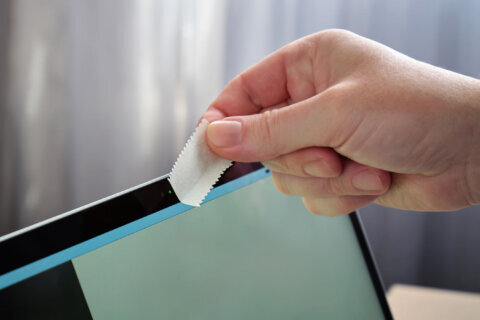This video is no longer available.
While the coveted 25- to 54-year-old market has been traditionally recognized as the sweet spot for advertisers, thanks to that group’s habitually strong purchasing power, the “graying of America” has now placed Baby Boomers — many today in their 70s to 90s — as a formidable target market audience segment.
And nowhere is that more apparent than in the world of technology.
This past week at CES, senior tech was everywhere. From robots that deliver medications, IoT (Internet of Things) sensors that connect caregivers and family members to patients, and eyeglasses that convert speech to text to enhance the personal interactivity of individuals with hearing loss; technology designed to help seniors live longer, better, more comfortable and independent lives were found in every corner of the show. Dozens of products were barely removed from the concept stage and some of the biggest names in the world of home appliances and household entertainment lined the startup pavilions.
And leading the way, of course, was D.C.-based AARP, which hosted a mammoth senior tech pavilion on the upper level of the Venetian Convention Center, showcasing 18 different companies while delivering 25 presentation sessions across the four-day event, all designed to focus on the varied and broad-ranging ways technology is improving lives of the elderly.
“Here at the AARP Innovation Age Lab Pavilion, we’re really excited to present our full lineup of startups and collaboration partners that have brought products to market designed to help us all age well at home,” said AARP senior vice president Andy Miller.
“As you can see, the focus here is on companies delivering products that are on the leading edge of technology — some are companies that focus on senior care and health challenges while others are bringing an aspect of fun to how we age. In the process, our program helps to spark innovation in the private sector. We do that by bringing together startup companies from across the country — and in some cases across the world — that are trying to create solutions for all of us as we age,” he said.
One of Miller’s personal favorites is a Capitol Hill company called Artifcts, a mobile and web-based platform that allows users to preserve memories, share stories and build a legacy designed to endure for generations, one cherished item at a time.
“Here at Artifcts, we help you capture, preserve and share the histories, stories, memories and value behind all your stuff that you can privately share with your family and friends,” said company CEO Heather Nickerson. “Our system allows you to deliver the meaning behind various objects that tell your story, such as the secret ingredients of your grandmother’s biscuit recipe. The beauty of Artifcts is that you put everything together in one place — photo, video, audio and story — so you can share your legacy with your children and grandchildren.”
But according to Nickerson, the product serves another purpose as well.
“In addition to those special, emotional connections that we help you create, Artifcts is a valuable tool for insurance companies who often use our product to document home inventories and valuables,” she said.
San Francisco-based Freestyle+, meanwhile, uses game play to help individuals build mental fitness.
“Mental fitness is an approach you would take just like you go to a gym to work on your biceps one day and your legs another day,” said Anthony Veneziale, Freestyle+’s conceiver and co-creator. “We know there are different parts of our brains that can be useful for certain applications in our life. For example, your medial lateral prefrontal cortex is important for creativity while cerebellum fosters music retention. We know how to stimulate these and all other parts of the brain to achieve a desired outcome through games.”
Meanwhile, Canadian company Revenant Systems, developed a solution to a problem we never really think about but one that most certainly emerges as a problem when the need arises. Their All-Life Digital Asset Manager (ADAM) app enables users to securely upload their digital legacies from their cellphones and, when the time is right, deploy technology to release those assets to specified individuals. This becomes an unfortunate issue when individuals die, without leaving direction to others as to how to access important digital information on their phones.
“As someone who experienced a near-death incident at a young age, I understand the significance of having a plan in place for when your time comes,” said Michael Okoye, co-founder and CEO of ADAM. “So, I sought to create a universal solution for managing legacies in the digital age. We believe this technology will eventually become as commonplace as two-factor authentication.”
But it’s not just the startups at CES that are making headlines. Several legacy appliance companies unveiled all-in-one combination washer-dryer units that serve to expansively uncomplicate life for seniors when it comes to doing their laundry.
The GE Profile Ultrafast 2-in-1 washer/dryer combo is a true game changer, said the company’s senior commercial director for clothes care, David Wilson.
“This is a full sized washer and dryer in one machine that works as fast and just as well as two separate machines,” he said. “It’s a great product for the senior community because you no longer have to remember to move the wet clothes from the washer, requiring fewer trips to the laundry room. It handles large loads — up to 10 pounds like a laundry basket full — in two hours so you’re saving time. But for elderly users, think about having to pick up cold, wet clothes, which is sometimes a challenge for folks with arthritis. Plus, the unit is super compact, which is perfect for people who are either downsizing or already living in smaller residences.”
In addition to GE, other legacy companies including Samsung, LG and TCL also introduced their own proprietary versions of the same technology, each echoing Wilson’s commentary on the benefits of this technology for the elderly.
From digital health care and enhanced communication to clean clothes, CES 2024 has proven — beyond a shadow of a doubt — that not only should seniors be seriously embracing technology, but also that the business world is making major strides to satisfy that demand.
Steve Winter and Kenny Fried are WTOP contributors who work for Brotman|Winter|Fried, a division of Sage Communications.
Get breaking news and daily headlines delivered to your email inbox by signing up here.
© 2024 WTOP. All Rights Reserved. This website is not intended for users located within the European Economic Area.







